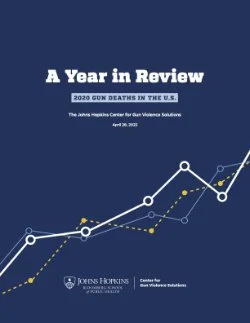A Year in Review: 2020 Gun Deaths in the U.S.
By The Johns Hopkins Center for Gun Violence Solutions
Gun violence is an ongoing public health crisis in the United States that impacts the health and well-being of all of us. In 2020, gun deaths reached the highest number ever recorded. According to data released by Centers for Disease Control and Prevention (CDC), more than 45,000 people died by gun violence in the U.S. As we struggled against the COVID-19 pandemic, a concurrent public health crisis intensified. Gun homicides rose dramatically across the country, increasing by 35% in just one year. Nearly 5,000 more lives were lost to gun homicide in 2020 than in 2019. Gun suicides remained at historically high levels. Guns were the leading cause of death among children and teens in 2020, accounting for more deaths than COVID-19, car crashes, or cancers.1 Coincident with the rise in gun-related deaths, 2020 was also a year of record gun sales. Millions of people, including many first-time purchasers, bought guns. Tens of thousands of these new guns turned up at crime scenes across the country—almost twice as many as in 2019.2 While it remains to be seen whether this surge in gun purchases contributed to the rise in gun violence over the long term, a strong body of research has identified drivers of gun violence—namely, easy access to guns and weaknesses in our country’s laws that create a patchwork of gun regulations. There are equitable, evidence-based solutions to prevent gun violence.
-
These solutions are supported by most people, including gun owners. In spite of their wide support, many policymakers have been unwilling to follow the evidence and enact policies that will save lives. The aim of this report is to illustrate the enormous toll gun violence has on our country. Ultimately, we strive to use these data to advocate for and implement life-saving policies and programs that will end the gun violence epidemic. This report builds off of “A Public Health Crisis Decades in the Making: A Review of 2019 CDC Gun Mortality Data” released by the Educational Fund to Stop Gun Violence in February 2021. Each year it is our mission to provide policymakers and the public the most accurate and up-to-date data on gun fatalities. This year’s report uses the CDC’s 2020 firearm fatality data, which only became available in late December 2021—an unacceptable delay that hampers potential responses to gun violence. We cannot solve a problem we cannot quantify. Without timely data, we lack the information we need to make the best possible decisions. Data collection and reporting related to gun violence must be more timely
Baltimore: Johns Hopkins Center for Gun Violence Solutions, 2022. 40p.


